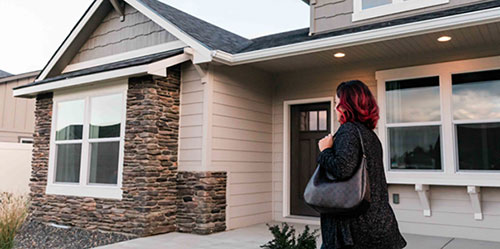
The housing market is often competitive, which can drive potential homebuyers to consider alternative solutions. Buyers looking for deals may turn to short-sale homes or foreclosure properties. If you are looking to buy a house below market value, what is the best option? How does the process work?
Let’s compare the differences between a short sale vs. foreclosure and discuss whether one of these options is right for you.
What is a short sale?
Many people are familiar with foreclosures, but what is a short sale? How does it differ from a foreclosure?
Both are considered distressed properties. When life circumstances change, some people fall behind on their mortgage payments. These distressed properties are often sold at reduced prices. Though similar circumstantially, the process of buying a short sale vs. foreclosure is different.
A short sale is when a mortgage lender allows the owner to sell their house for less than their mortgage debt. The lender does not evict the homeowner, and the seller is able to avoid a foreclosure, which would be more damaging to their credit score.
When the remaining balance on a mortgage loan exceeds the home’s market value, it has negative equity, also known as “being underwater.” Choosing to sell their property, the homeowner receives permission from the lender to sell it for less than the remaining balance. Though the lender loses money, they too avoid the costly foreclosure process.
This transaction can benefit all parties involved. Both the lender and the seller avoid foreclosure costs, and the buyer can get a home at a reduced price.
How do you buy a short-sale home?
Buying a short sale is similar to buying any house on the market. However, there are risks to consider, and the process can take six months or more to close.
First, find a short-sale home and then get pre-approved for financing. Consider working with a real estate agent when buying a short sale. Though you can find properties yourself using the Multiple Listing Service (MLS), navigating the risks involved with an experienced agent can give you an edge.
Once you are pre-approved, you can make an offer and negotiate the sale and contingencies. Contingencies are important in a short sale because they protect the buyer. Certain conditions should be met for the sale to go through. Keep in mind, a short sale is sold as-is. Meaning, the seller will not lower the price to cover any problems revealed during an inspection, nor will they be required to make any improvements before the sale is finalized. Make sure to include a home inspection as a part of the contingency. You can back out without consequence if the repairs are too substantial.
What is a foreclosure?
A foreclosure is when the property is seized and put up for sale by the lender. The homeowner has stopped making payments on the mortgage, putting control in the hands of the lienholder. Unlike a short sale, the house is now owned and sold by the lender.
Mortgage contracts include liens on the property. The lien protects the lender in case the homeowner defaults on the loan. After 90 days of missed payments, the lender sends a notice of default and takes possession of the home after a set time. The impending sale is then registered with the county, and a notice of trustee sale is issued. Typically, the house is sold at auction and is purchased by a private buyer. If it doesn’t sell, it becomes part of the lender’s real estate owned (REO) inventory.
How do you buy a foreclosure?
You can either negotiate with the lender or buy a foreclosure at auction. Purchasing a home at auction can increase your opportunity to buy a house below market value. Keep in mind that most auctions only accept payments in cash. You will need to have access to this cash before purchase, so be prepared. If the auction does accept financing, make sure to have a verified pre-approval.
Foreclosure homes are sold “as-is.” Unlike a short sale, you cannot get an inspection or appraisal before buying. There may be more damage with a foreclosed property since the homeowner struggled to make payments.
You may also purchase from the lender’s real estate owned inventory. An REO agent usually works with a standard real estate agent. Look for an agent who has experience working with foreclosures and REO agents.
Ask your agent to help you find foreclosure properties, and make sure to get pre-approved for a mortgage. Once you have found a property, order an inspection and appraisal if allowed, then decide if you want to move forward and submit an offer.
Short sale vs. foreclosure – which is right for you?
When deciding between a short sale vs. foreclosure, it is important to keep in mind that each has its own benefits and risks. Weigh the pros and cons of a short sale vs. foreclosure to decide which is right for you. Or, if you aren’t ready to take the risk, you may prefer to move forward with a traditional home purchase.
Let’s look at some of the pros and cons to help you decide:
Pros of short sale
Less competition. There is less competition with short sales than foreclosures. With foreclosures, you often compete with investors and real estate agents ready to buy and flip.
More affordable. Short sales often sell below market value.
Better condition. Typically, short sales are in better condition than foreclosures.
Cons of short sale
Long process. Short sales can take a long time to close as lienholders resolve issues; you may wait a while for approval.
More risk. Properties are sold as-is, and you are subject to a homeowner changing their mind and paying off their past due balance.
More effort. Short sales may require additional documentation and more follow-up with the lender.
Pros of foreclosure
Faster process. Foreclosures tend to sell quickly. Buying in cash means a faster transaction than a short sale.
Clean title. When the lender forecloses a property, they clear the title of any liens or encumbrances.
More affordable. Foreclosures also tend to sell below market value.
Cons of foreclosure
Poorer condition. These homes can be neglected or abandoned and may need substantial repairs.
More competition. You may have to keep up with competitive real estate agents and investors.
Cash purchase. You will likely need a large sum of cash to purchase a foreclosure.
Weigh these factors, look at your timeline and budget and decide which, if any, is right for you. Partner with the right lender when seeking mortgage pre-approval and financing.
Get moving with Solarity Credit Union. With competitive rates and flexible loan terms, our Home Loan Guides can’t wait to partner with you. We make the mortgage process simple, fast and affordable so you can focus on creating memories, not paperwork. Get started today!What's your Solarity story?
We're on a mission to tell the stories of our members and how they are living their best lives. Do you have a Solarity story to share?



